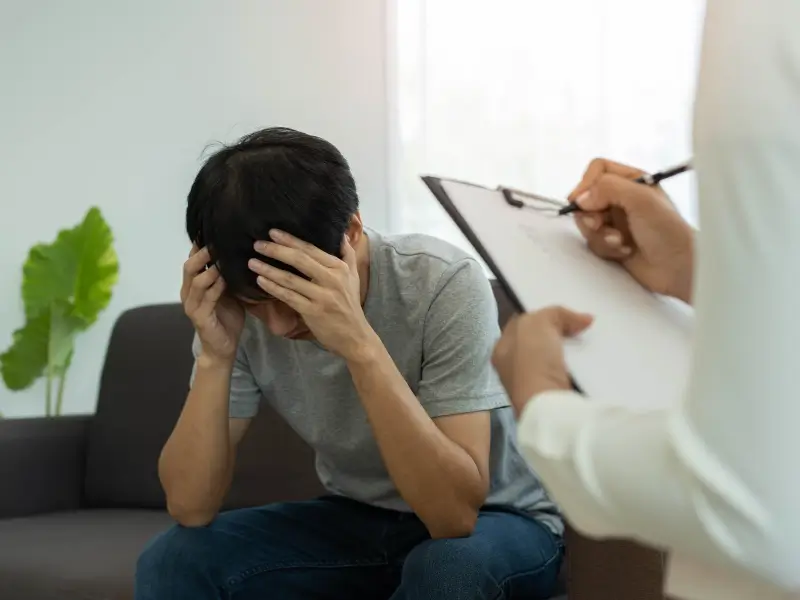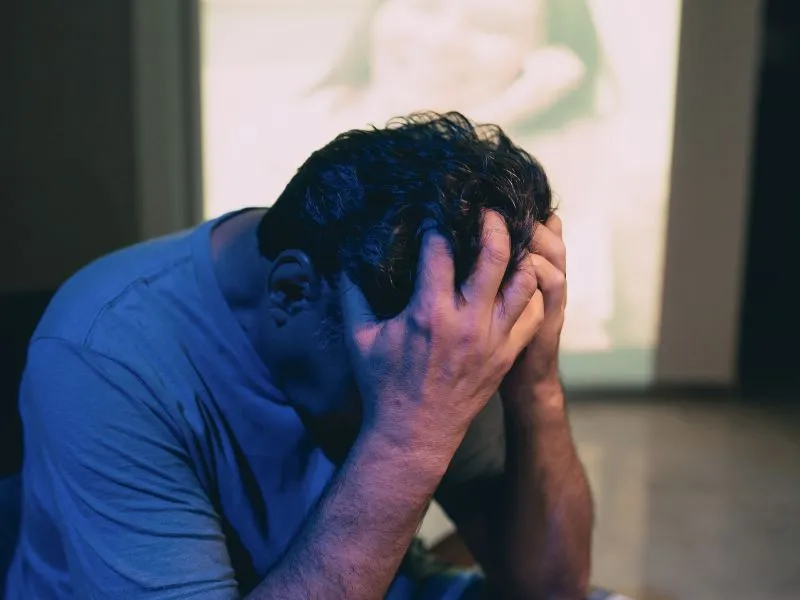"We don't give mental health the same kind of attention as physical health and that is a huge mistake given that they are interconnected,"
Depression
Depression is a low state in which life seems dark, accompanied by feelings of sadness that are overwhelming and hard to deal with. Depression brings severe psychological distress, which is persistent. Anyone who is suffering from depression may lose their will to carry out daily tasks and may feel that their life has no purpose and, as a result, lose their will to live. Irrespective of age, anyone can suffer from depression. In a study, it was noted that people generally in their forties experience depression mostly because this is the age when existential crises kick in. However, a recent study conducted by WHO quoted that the median for depression lies in the age group of 26 years. It even noted that women are more likely to experience symptoms of depression than men.
Symptoms of Depression
The picture of depression may vary from person to person. Depression has many symptoms other than sadness. The symptoms, which often exacerbate one another, span five areas of functioning: emotional, motivational, behavioural, cognitive, and physical.
Emotional Symptoms
Most people who are depressed feel sad and dejected. They describe themselves as feeling “miserable,” “empty,” and “humiliated.” They tend to lose their sense of humor, report getting little pleasure from anything, and, in some cases, display anhedonia, an inability to experience any joy at all. A number also experience anxiety, anger, or agitation.
Motivational Symptoms Depressed people typically lose the desire to pursue their usual activities. Almost all report a lack of drive, initiative, and spontaneity. They may have to force themselves to go to work, talk with friends, eat meals, or have sex. This state has been described as a “paralysis of will.” Suicide represents the ultimate escape from life’s challenges. Many depressed people become uninterested in life or wish to die; others wish they could kill themselves, and some actually do.
Behavioural Symptoms
Depressed people are usually less active and less productive. They spend more time alone and may stay in bed for long periods. Depressed people may also move and even speak more slowly.
Cognitive Symptoms
Depressed people hold extremely negative views of themselves. They consider themselves inadequate, undesirable, inferior, and perhaps evil. They also blame themselves for nearly every unfortunate event, even things that have nothing to do with them, and they rarely credit themselves for positive achievements. Another cognitive symptom of depression is pessimism. Sufferers are usually convinced that nothing will ever improve, and they feel helpless to change any aspect of their lives. Because they expect the worst, they are likely to procrastinate. Their sense of hopelessness and helplessness makes them especially vulnerable to suicidal thinking. People with depression frequently complain that their intellectual ability is poor. They feel confused, unable to remember things, easily distracted, and unable to solve even the smallest problems.
Physical Symptoms
People who are depressed frequently have such physical ailments as headaches, indigestion, constipation, dizzy spells, and general pain. Disturbances in appetite and sleep. Most depressed people eat less, sleep less, and feel more fatigued than they did prior to the disorder. Some, however, eat and sleep excessively.
Few Major Depressive Disorder :
Clinical depression (major depressive disorder): Clinical depression is one of the most common and severe forms of depression. It is common to feel sad some days, but that does not mean you have clinical depression. A diagnosis of clinical depression is when you’ve felt low or worthless for a prolonged period of time. Other symptoms of clinical depression include a change in appetite or losing interest in activities you used to enjoy.
Disruptive mood dysregulation disorder (DMDD): This form of depression is diagnosed in children. The identifiable symptoms of this disorder begin by the age of 10. If a child experiences frequent anger outbursts or intense irritability, then the kid might have DMDD
Seasonal affective disorder (seasonal depression): This form of disorder usually happens due to a lack of vitamin D. It occurs mostly during monsoons and winters.
Prenatal depression and postpartum depression : This is a form of depression that usually happens during pregnancy. A mother can go through the symptoms of this depression that develop within four weeks after the delivery of a baby.
When to seek the Counsellor for Depression : People often consider reaching out for mental health professional help as some form of weakness because of the associated taboo. However, they must understand that it is not a weakness but a significant step for their overall well-being. It is important to reach out and ask for help whenever needed. It is important for your self-care. People don’t know when they should reach out for professional help. The following are the symptoms and signs explained to help you know when it is time for you to reach out.
You're having difficulty managing and regulation your emotions. While we all feel sad or angry at some point in our lives, it's important to pay attention to how you are expressing your emotions.
Your performance has reduced at work or school. A decrease in productivity at work or school is a common sign among those struggling with depression.
Your sleep or appetite routine has changed. "Mental health issues can have a profound impact on our sleep and appetite; an individual who is experiencing depression may have sleeplessness, while someone who is severely depressed might sleep all the time," Similarly, "when overwhelmed by stress, some people overeat to dull their emotions, while others find they can barely eat,"
You losing Interest in activities you used to enjoy earlier. People struggling with depression often feel disconnected from life. They lose interest in things they usually loved to do, whether it's hobbies or socializing.
You're experience struggle to maintain relationships. Our mental health indeed can impact our relationships in a variety of ways—it might lead a person to pull back from those who are close to them, cause insecurity in a relationship.
How therapy can help and what are the types of Therapy Approaches
Therapy is considered a key component in helping an individual overcome depression. It helps in getting rid of the negative thoughts and understanding by reconnecting, what brings you joy. It is signifciantr to note that forcing someone into therapy treatemtnt doesn’t work. However it is important to motivate an individual to take the treatment for their well-being.
Here are Several therapy approaches which can be helpful in dealing with depression:
Cognitive-behavioral therapy (CBT): Negative thoughts contribute significantly to depression. CBT helps in not only identifying but also changing those negative thoughts.
Interpersonal therapy (IPT): Interpersonal therpay focuses on one’s relationships Depression can often lead to social isolation among individuals. Interpersonal therpay helps in managing one’s relationships with others.
Mindfulness-based cognitive therapy (MBCT): This therapy is a combination of cognitive behavior therapy and meditation. It includes mindfulness practices and allows you to focus on your present moment. It helps one to accept their thoughts and feelings without any judgment.
Psychodynamic therapy: This therapy focus on locating the root cause of one’s depression. It helps you understand how your past experiences may be affecting your present. It also explores the unconscious roots of depression.
Behavioral therapy: Such therapy includes aspects like reinforment and punshment. If a child shows good behaviour, then that is reinforced so that child can repeat that behaviour. The goal of such therapy is to reinforce desireble behaviours and also eliminate undesirable or unwanted beaviour.
Positive Psychology Interventions : Such therapy do not focus on finding the root cause of depression. It rather focuses on growing wellbeing of individual by building the life of purpose that allows individual to flourish and achieve their highest potential. It includes:
- Gestalt therapy: It works by focusing on the ‘whole’ rather than parts. It emphasis that the whole of anything is better than the parts.
-Existential therapy: It is an approach dervided from existentialism. It is rooted in the idea that humans have free choice and free choice allows to create purpose in life.
It is important to note that there is no one-size-fits-all treatment for depression. The best type of therapy for you will depend on your individual needs and preferences. If you are struggling with depression, it is important to reach out to a mental health professional for help. They can help you determine the best course of treatment for you.
Solh Wellness is a preventive mental health platform that focuses on adopting practices that help improve the mental well-being of individuals. You can get the following at Solh Wellness:
Normalises Seeking Help: Solh combats the stigma connected with mental health by establishing a judgment-free zone. This can encourage someone who is struggling to seek expert help.
Anonymous Support Groups: Connecting with those who understand your problem can be helpful. Sharing experiences and realizing they are not alone can provide a great source of comfort and encouragement.
Talk Now: It have access to a counselor who can help you guide you through any hiccup you face.
Clinical Support: The app's simple access to confidential consultations can be an excellent initial step for someone struggling to achieve goals who is hesitant to pursue traditional in-person therapy.
Other: Solh is a one-stop place for accessing and navigating different sources, such as audio, guides, and reading material, to help you deal with any ongoing stressor.
Download the Solh App Now!



